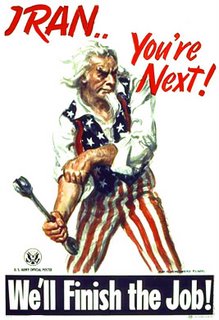Quote of the Day: "Freedom is crawling — over broken glass."

That pessimistic quote - no doubt to the chagrin of the Bush administration - came from an anonymous State Department official, in stark contrast to President Bush's frequent contention that "freedom is on the march" in the Middle East.
Indeed, in spite of Bush's militaristic approach to forcing democracy on the Middle East, many countries actually are gravitating more closely toward Islamist-controlled governments. If you think about it, it's kind of like independent-minded teens who rebel against their parents (not a perfect analogy, but you get the idea). Many in the Middle East want nothing to do with the United States' presumptuous approach to how Middle Easterners should be governed. Even if many in the Middle East might prefer the democratic approach, as many likely would, that doesn't mean that they want others - in particular, the "holier than thou" Americans - telling them what to do.
President Bush's efforts to spread democracy to the Middle East have strengthened Islamists across the region, posing fresh challenges for the United States, according to U.S. officials, foreign diplomats and democracy experts.
Islamist parties trounced secular opponents in recent elections in Iraq and Egypt.
Hamas, the armed Islamic Palestinian group, appears set to fare well in Palestinian parliamentary elections Jan. 25, posing a quandary for how the United States and Israel pursue peace efforts. Hamas has carried out suicide bombings against Israel and calls for the country's destruction.
In Lebanon, the Shiite Muslim militia Hezbollah is part of the government for the first time.
Washington considers Hezbollah and Hamas, both of which have Iranian support, to be terrorist groups.
"In the short run, the big windfall winners ... have been the Islamists," said Michael McFaul, a Stanford University expert on democracy and development.
In the long run, democracy probably will lead to a more stable, economically flourishing Middle East, McFaul recently told a Washington conference. But, he added, "We're taking a chance."
Democracy isn't something that can be forced on others, especially those who are already suspicious of - or even downright hostile toward - anything that is espoused by the United States' government. Let's face it, in spite of what Bush, Cheney and company would like to believe, the U.S. doesn't have a good reputation in much of the world. And attempting to force something upon them isn't going to help matters much. In fact, it very likely is making things worse.
In a region renowned for governments dominated by religion and competing ethnic tribes for hundreds if not thousands of years, to force a radical, overnight change to something as foreign as democracy is nothing but a fantasy. And turning such a fantasy into reality will not come without an unbearable price - or wait - for decades, if not centuries, to come.
Perhaps the United States should try a different tack, like benevolence and diplomacy perhaps? Unfortunately, both concepts are about as foreign to the Bush administration as democracy is to those in the Middle East. Until we have a more astute administration in place, the gulf between fantasy and reality will remain virtually unbridgeable.



5 Comments:
'Democracy' does seem to lend itself to the rise of religious nuts, doesn't it?
We seem to always fail at micromanaging the world with applied force.
Firstly, what our minders purport to support or champion never turns out to be what they in fact actually supported.
Secondly, once what our minders have supported is toppled - it is not too selom replaced by our worst nightmares.
Maybe it's time we got a bit of dat democracy in all levels of our own governing bodies.
Compare and contrast:
From debates.org, 2000 Presidential Debate #2:
BUSH: Make a couple comments.
MODERATOR: Sure, absolutely, sure. Somalia.
BUSH: Started off as a humanitarian mission and it changed into a nation-building mission, and that's where the mission went wrong. The mission was changed. And as a result, our nation paid a price. And so I don't think our troops ought to be used for what's called nation-building. I think our troops ought to be used to fight and win war. I think our troops ought to be used to help overthrow the dictator when it's in our best interests. But in this case it was a nation-building exercise, and same with Haiti. I wouldn't have supported either.
And yet...from reference.com's encyclopedia (read: the Wik on repeater):
"Nation-building refers to the process of constructing or structuring a nation using the power of the state. This process aims at the unification of the people or peoples within the state so that it remains politically stable and viable in the long run. Nation-building can involve the use of propaganda or major infrastructure development to foster social harmony and economic growth. It has been succinctly described as "the use of armed force in the aftermath of a conflict to underpin an enduring transition to democracy."
"Examples of nation-building include the Marshall Plan and the current occupation of Iraq by the United States and United Kingdom."
So, nation building isn't okay, unless you're the one bulding the nation. Do I have that correct? Anything I'm leaving out?
Yes, something about casting the first stone from a glass house. We talk a good game about democracy, but all too often we find that many of us are not too sure exactly what it is. And perhaps that's part of its allure, namely its ability to reinvent itself over time.
Without dissent, however, democracy would fail miserably. And any attempt to discourage or crush dissent, as the Bushies often seem to favor (either explicitly or implicitly), is an attempt to discourage or crush democracy. Many in this country need to remember that.
vcthree-
That's right. It wasn't long ago that the Republican Party platform expressly indicated that nation-building and involvement in far-flung military engagements was most definitely OUT. That was their approach to international relations. Yet, now, we learn that Bush and company have become obsessed with spreading freedom and democracy...by force, if necessary.
Did they change their minds based on the events of 9/11? Terrorism was a threat long before then.
Or, were they simply being disingenuous in order to get elected? I find it hard to believe that such a profound change in course - and ideology - came about so quickly. I suspect that the neo-cons were laying in wait until the necessary events presented themselves. These leopards didn't change their spots overnight.
Post a Comment
<< Home